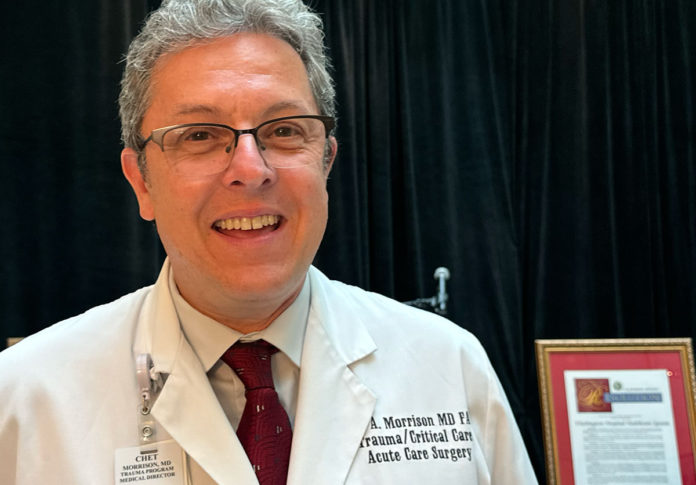No one wants to imagine themselves or a loved one sustaining a life-threatening injury. But if we do, most of us probably imagine the injured person being sped in an ambulance to the nearest emergency room—hopefully minutes away, certainly within our city. But it may not happen that way. Severely injured patients needed to be transported to a trauma center for specialized care. For East Bay residents, the two closest trauma centers were East Bay Trauma & Acute Care at Eden Medical Center and San Jose Regional Medical Center. On June 24, Washington Hospital in Fremont held a ribbon cutting for its new Level II trauma center, fulfilling a critical need in local healthcare.
At the event, Kimberly Hartz, CEO of Washington Hospital, shared, “When I took this job in 2019, people would come up to me and say, ‘If I’m in a major accident, why can I not come to my community hospital?’ They did not understand the difference between a trauma center and a Level I, Level II, Level III. I said, ‘We are working on it,’ and today that is becoming a reality —We know in the Bay Area the traffic patterns can be difficult and it can take 45 minutes or more to go either north or south to the to the nearest trauma center. But as of July 1st, they can come to Washington Hospital.”
Lauri McFadden, director of Alameda County Emergency Medical Services Agency, talked about the planning that went into opening a trauma center in the Tri-City Area. After a year-long assessment of existing trauma centers in 2021, it was determined that the population growth in the Tri-City Area called for an additional trauma center. Washington Hospital was designated as the location in June 2022, and given five years. The center was built in two.
Dr. Chet Morrisson, Trauma Program Medical Director at Washington Hospital, explained that the concept of a “trauma center” is fairly recent, dating back to 1966. “As society expanded, as the economy expanded, there was a need for hospitals that could provide the integrated care that seriously injured patients could use, that could incorporate the lessons that we learned during wartime and incorporate the latest surgical advances in terms of resuscitation and operative care.” Also in 1966, a report from National Highway Traffic Safety Administration on vehicle caused injuries highlighted the need for specialized care.
There are different levels of trauma center, from Level I, providing the most comprehensive care, to Level V, providing stabilization, diagnostics, and preparation for transfer to other facilities. Washington Hospital has a Level II Adult Trauma Center, which means it has 24-hour coverage with surgeons and specialists, and can initiate care for patients, although some may later be transferred to a Level I trauma center. (An explanation of trauma center levels can be found at: www.amtrauma.org/page/traumalevels.)
A Fremont couple spoke on their experience with the life-saving care provided by a local trauma center. On June 1, 2016, Jorge, an officer with Fremont Police Department, sustained a gunshot wound to the head during a traffic stop. Fortunately, another officer was able to flag down a nearby ambulance with a paramedic on board. But the closest trauma center was San Jose Regional.
Jorge had just completed his two-year probationary period with Fremont PD, and his wife Daisy had just graduated from nursing school. He shares, “We were on high. I started my career. She was going to start hers. So things were looking up. But then that day, our whole lives changed. Luckily, the stars aligned. I was safely transported, Daisy spoke about the support from the trauma center staff, for Jorge during his treatment and rehabilitation, and for her as a patient family member. “Thank God my husband not only survived, but he’s cognitively mostly intact. That is why, I’m so happy and excited to see that the City of Fremont finally, has its own trauma center, that will serve the South Bay community. I think it’s going to save so many lives.”
The ribbon cutting was the culmination of years of planning, but for Washington Hospital it’s only the start. Kimberly Hartz said, “Trauma preparation has been a journey for our health care system, but it’s important to remember that this journey doesn’t end on July 1st when we see our first patient. Trauma care is a continuous journey, one that requires ongoing commitment, dedication, and improvement.” to San Jose Regional Medical Center, the nearest trauma center to Fremont. Because our Fremont didn’t have a trauma center.”




